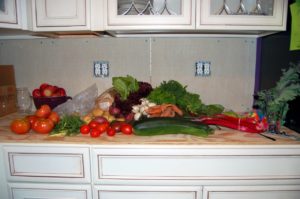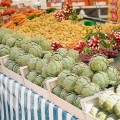I was recently looking to purchase organic seeds for my garden, but came across some labeled “heirloom.” Another packet said “heritage.” Is there a difference? What do these labels mean?
Thank you,
[name redacted]
Most people know what the word “organic” means, particularly when it comes to fruits and vegetables. They are grown without harmful pesticides, often in organic soil. But, heritage and heirloom are slightly different. Usually, the word “heritage” is used for poultry and livestock. You might find breeds of heritage chickens, such as the Jersey Giant and Rhode Island White, or pigs, like the Hereford, Mulefoot, and Red Wattle. These heritage animals have restricted lineages, are not genetically modified, and represent some of the earliest original animal breeds in the United States. They look quite different than the traditional farm animals, because most people are only used to seeing the genetically modified varieties.
Heirloom, on the other hand, refers to plants. They are the equivalent of heritage livestock, only in fruit and vegetable forms. The seeds are from non-genetically modified varietals, and, just like their animal counterparts, look and taste quite different than the veggies you’ll find at the grocery store. Everything from tomatoes to potatoes, beans, peppers, and carrots are available in heirloom varities. Examples of them are: Scarlet Nantes Carrots, All Blue Potatoes, Cherokee Trail of Tears Beans, Fatali Peppers, and Bloody Butcher Tomatoes. These fruits and vegetables are no harder to grow than the GMO types, but might produce less, which is something to keep in mind when you’re planting them.
You might find some seeds labeled either “heritage” or “heirloom,” although the correct term is the latter. Either way, you’re getting non-GMO seeds that are usually organic. There are plenty of places to buy these seeds, but if you’re looking for rare varieties, you’ll have better luck online. These non-hybrid vegetables will sometimes look unique (white or purple carrots!), taste great, and be the talk of your neighborhood. Plus, once the plants have gone to seed, you can harvest the seeds and use them to plant new fruits and vegetables next year, thus doing your part of keep these heirloom plants going.
Pic by ilovebutter





One important thing to note for heirloom plants is whether they are organic or non-organic. In most cases, heirloom plants are organic because they are generally only used by small-scale gardeners who do not use pesticide or other harmful chemicals. However, there may be minor cases when chemicals do get involved since heirloom plants do not always have a similar level of innate protection that hybrid and GMO plants provide against diseases and pests. Remember, heirloom refers to the heritage of a plant, while organic refers to a growing practice. They are two different things.
Thank you for the comment, Luna! I appreciate it!